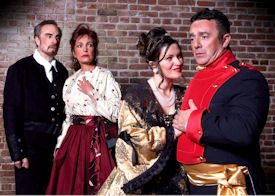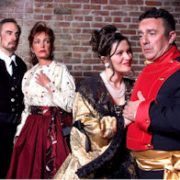ANYBODY FOR ZARZUELA?
 If you haven’t experienced a zarzuela yet, treat yourself. No, zarzuela is not some tempting culinary concoction from south of the border. It is a delectable musical concoction with folk and operatic roots in Spain. And a sumptuous production of one of the most popular works of the genre, Luisa Fernanda, is gracing the stage of the Ricardo Montalban Theatre in Hollywood February 19-21.
If you haven’t experienced a zarzuela yet, treat yourself. No, zarzuela is not some tempting culinary concoction from south of the border. It is a delectable musical concoction with folk and operatic roots in Spain. And a sumptuous production of one of the most popular works of the genre, Luisa Fernanda, is gracing the stage of the Ricardo Montalban Theatre in Hollywood February 19-21.
Now for Zarzuela 101: The zarzuela (pronounced zar zway’la) is a form of musical theater involving opera singers (This is FolkWorks-relevant, I promise!), but which features virtually equal parts spoken dialogue and singing. In this respect, it is closer to the operetta or the Broadway musical than to opera. It said to have originated in the 1640s when actors performed for King Philip IV in Madrid’s El Prado Park. According to legend, the art form was named for the blackberry bushes (zarzas) that grew amply in the park. Although the Italian and French opera styles influenced them to some degree, the musical comedies and melodramas in the zarzuela repertoire retained their distinct Spanish personality. By the early 20th century, zarzuela productions had become a populist form of entertainment, distinct from the opera performances attended by the upper classes and nobility. They reached their height of popularity in the 1920s and 30s at a time when the political content embedded in the libretti made them a rallying point for the masses.
Luisa Fernanda, composed in 1932, perfectly exemplifies the zarzuela‘s artful marriage of music, message, and story. It is set against the backdrop of the 1868 popular uprising against Queen Isabella II of Spain. “The themes of Luisa Fernanda relate to the universal desire for democracy,” says Dr. Carlos Oliva, artistic director of the Pacific Lyric Association, which is staging the work. “The uprising was the first time in Spanish history that the people protested their monarchy and demanded a government that spoke for the people. All this is reinforced with beautiful music and voices.”
The Pacific Lyric Association is a non-profit organization dedicated to making the operatic art more accessible to the general public through education and affordable ticket prices. Having started in 2006 with a series of concert performances, Dr. Oliva wants to devote special attention to producing zarzuelas in Southern California with its Hispanic heritage and population. Luisa is his most ambitious project to date and he is taking pains to make it as authentic as possible. The PLA will present the complete libretto of the Luisa Fernanda, unlike the Los Angeles Opera, which cut out most of the spoken dialogue in its 2007 production. Colorful period costumes and sets will reflect the different social classes of mid-19th century Spain. As with opera, there will be no microphones or amplification.
Traveling from Spain to conduct the orchestra is Federico Moreno-Torroba Larregla, the son of the Luisa Fernanda’s composer. Federico Morena Torroba wrote a great deal of instrumental music, opera, and ballet, but is best remembered for his zarzuelas and the zarzuela troupe he founded. In fact, Torroba’s touring company introduced the zarzuela to audiences in the U.S. and Central America during the 1930s and 40s. “My father was close friends with the librettists (of Luisa Fernanda), Federico Romero and Guillermo Fernandez Shaw,” says the Moreno-Torroba Larregla. “They met at the café every day to drink, eat, and talk about art and politics. My father was a man of conservative political and social ideas who supported the monarchy. When Romero and Shaw showed him their libretto for Luisa Fernanda and asked him to compose the music, he was struck by the parallels between the Spanish political climate of 1868 and the one in 1932.”
The prominence of spoken dialogue in the zarzuela demands that the performers be strong actors as well as singers. In this respect, the PLA production is largely a family affair. Dr. Carlos Oliva, who has performed in operas in Paris, Spain, and Southern California, plays the pivotal role of Vidal Hernando, a monarchist who declares himself a revolutionary in order to win Luisa Fernanda’s affections. His daughter, Teresa Hughes-Oliva, whose resume also boasts opera roles in local and international venues, plays the title role. Directing the production is Dr. Oliva’s son Gabriel Oliva, whose credits are mainly in spoken theater. Supporting players include Jose De Vega, veteran of the Teatro Espanol in Madrid and Johanna Siegmann whose credits range from Mexico City to New York and L.A. Over a dozen other supporting singer-actors round out the cast. Based on these credentials, the upcoming Luisa Fernanda promises to showcase the zarzuela tradition in all its splendor.
You’ve never experienced a zarzuela? You have four chances to catch performances of Luisa Fernanda at the 1,000-seat Ricardo Montalban Theatre while tickets last – Thursday, February 19 and Friday, February 20 at 8:00pm and Saturday, February 21 at 3:00pm and 8:00 pm. To purchase tickets, which range from $20 to $75, call 323-960-1057 or go to www.luisafernanda.org. The Ricardo Montalban Theatre is located at 1615 Vine Street (between Sunset and Hollywood Blvd.), Hollywood CA 90028.
Audrey Coleman is a writer, educator, and passionate explorer of world music and culture.













